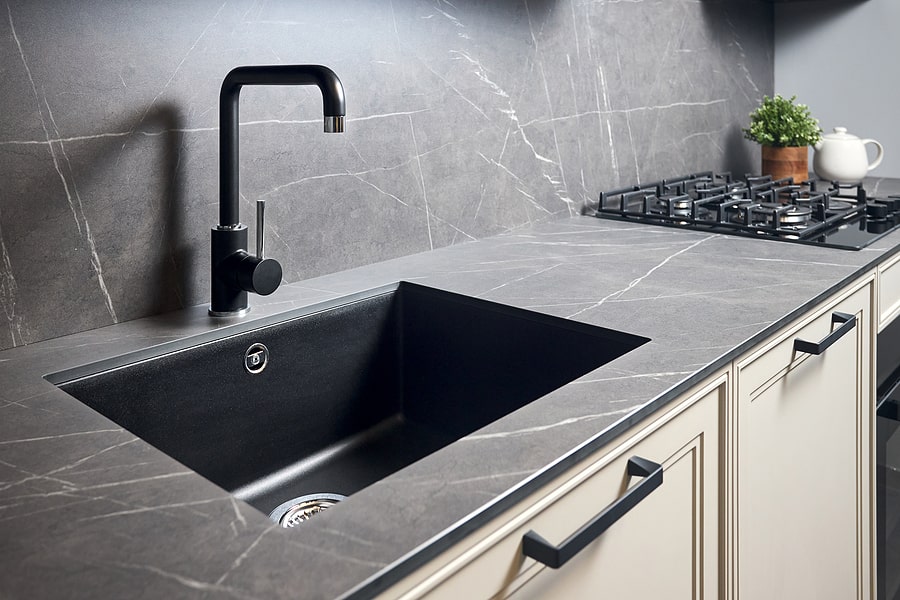A clogged kitchen sink can be such a headache. This problem disrupts daily routines and causes frustration amongst homeowners. Dealing with this common household issue is vital to maintaining a smoothly functioning kitchen. Let’s explore a list of items to keep an eye on, sharing some useful tips, and discuss when it’s best to get the professionals involved.

Preliminary Checks
What Type of Clog?
Some clogs are caused by food debris, while some are from more serious issues such as a blockage in the pipes. Assessing your sink and doing some preliminary checks allows you to see the severity of the clog. This is vital to determine your approach to fixing the issue at hand.
Ensure Safeness
By evaluating your clog, you can identify any potential hazards. Hazards such as any electrical outlets close to the sink. This is dangerous if exposed to water, it is recommended to unplug and move anything that is plugged into those outlets.
Save Time, Effort, and Money
When you analyze the clog, you are dictating what the next steps are going to be. That is why it is important to assess the clog when you first notice it, so you can find the best approach to take to fixing the issue. Whether that is a DIY project or hiring plumbing professionals is determined by the complexity of the problem. This saves you time, effort, and money.
Using a Plunger
A Household Item
Plungers are a common household item that is affordable and readily available. Accessibility to a plunger makes them the first line of defense when needing to plunge the kitchen sink. With how easy a plunger is to use; it allows you to take immediate action.
Usefulness
When dealing with different types of clogs, plungers are very useful. They can dislodge obstructions caused by grease buildup, food particles, soap scrum, etc.
Cost-Effective Method
Plunging is a cost-effective method that can save you money. As mentioned above, you can take immediate action to the problem at hand and avoid hiring a plumber to fix the issues. With this, you get your problem solved quicker, saving you time as well.
The Baking Soda and Vinegar Method
Chemical-Free Solutions
Some other common household items are baking soda and vinegar, these natural non-toxic substances are chemical-free solutions. Using this method eliminates the possible usage of harmful chemical drain cleaners. Those cleaners can damage your pipes and pose health risks.
Controls Odor
Using these two can help neutralize smelly odors coming from the clogged sink. The chemical reaction between these two substances results in eliminating awful smells.
Safe Option
This strategy is also safe since both baking soda and vinegar are gentle on your plumbing system. This method is specifically popular for those that have older and more fragile pipes. Using this approach won’t damage the pipes, which makes this a safe DIY project.
Drain Snake or Auger
Effective Removal
Drain snakes and augers are designed to reach deep into your plumbing systems. These tools are efficient at breaking through and removing tough clogs caused by objects, grease buildup, and debris. Also, with this method, you are better off preventing future clogs to form in the same locations. Making this option a great long-term solution.
Prevent Pipe Damage
Drain snakes and augers are two mechanical tools that are also non-damaging to your plumbing system. When used correctly, they are unlikely to cause harm to your pipes, which makes them a safe option. If you are unaware of how to use them, simply research or reach out to local plumbing professionals.
Versatility
These items come in many lengths and types, making them more suitable for different clog situations. Drain snakes and augers can be used for clogs in sink drains, trap arms, and even deep into the sewer line if necessary. These products offer versatility, allowing you to handle a wide range of plumbing issues.
When to Call a Professional
Sometimes, when it comes to a DIY project, there’s only so much you can accomplish. While these methods we have suggested are ideal to fix a clogged sink, there are certain times when it is best to just call the professionals. Below, we have listed situations of when it is best to seek the expertise of a plumber:
- Complex clogs
- Reoccurring clogs
- Smell foul odor
- Slow drainage
- Inadequate water flow
Through a proper inspection, you are more likely to get guaranteed results and ensure that your kitchen sink smoothly operates. Also, plumbers will advise you with preventative maintenance tips, which is beneficial as it prepares you with information to handle a situation if it were to happen again.
Hattersley Is Ready to Help
Understanding these tips and methods will allow you to take a proactive approach to unclogging your kitchen sink. Analyze the situation and determine whether it can be a DIY project or one better off for the professionals. If you find yourself with questions, reach out to us at (866) 395-6882 or fill out a contact form!



